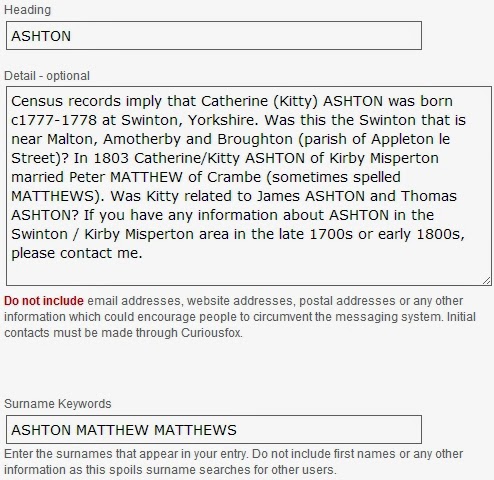Archives in a particular region usually hold wills or probate records for many people who lived or died in other regions. That's why I deliberately chose not to mention a location in the title of this post.
I've found an amazing amount of information about people in
other States and even
other countries in
NSW Will Books 1800-1952. Countries mentioned include England, Scotland, Ireland, Wales, New Zealand, Canada, USA, South Africa, Germany, Fiji, Mexico, India, Holland, China, Papua, New Guinea, etc.
The original books are held by State Records New South Wales. Before 1924 they contain handwritten copies of the wills. Between 1924 and 1952 the copies were typed.
Images of the Will Books are on
FindMyPast. Searches are free (you only pay if you want to see an image or transcription). My search tips are shown below. Start with strategy no.1, then try no.2, and so on.
 |
| Search screen for NSW Will Books 1800-1952 |
- Search for a name in 'Who' (you can use asterisks as wildcards). 'Death year' is optional, and you can select 'give or take' (+/-) up to 40 years. For now, ignore the 'Residence' field.
- In the separate field called Heirs' or executors' last name, enter a surname (you can use asterisks as wildcards), but leave both of the Who fields empty.
- If you use the Residence field, use wildcards. You'll understand why if you search for *Brisbane*, with asterisks before and after, and note the residences shown in results! Data in the Residence field is not entered in any set format. It may be just a town, or just a State, or just a country, or town+State, or State+country, etc (with or without punctuation, which makes a difference to the results). Sometimes places are abbreviated (eg, Queensland / Qld).
- Experiment with other variations and combinations. Keep a list of the search criteria that you use, because you may later think of other ways to search.
- When you use the Heirs' or Executors' Last Name field, be aware that the results may be incomplete. For example, you won't find heirs and executors of Julia COUTTS because (although they are shown in her Will Book entry) the names have not been included in the transcription. Presumably you could add them to the database by clicking 'Report an error in this transcription' and entering the names in the appropriate fields.
- It is essential to view images of the original Will Books, because a 'transcription' does not include the will itself.
- Click 'Learn' above the search boxes to find out more about the collection.
Although only a few of my ancestors were in New South Wales, I've already found fifteen wills - and that's just from random searches 'off the top of my head'. Imagine what I might achieve if I get organised and do systematic searches in
Will Books 1800-1952!
(This post first appeared on http://uk-australia.blogspot.com/2016/04/will-books-1800-1952.html.)
I use and recommend...




